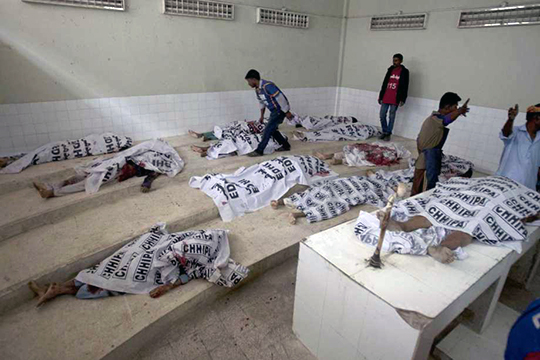Islamabad, Feb 17: Pakistani security forces today killed more than 24 militants in a nationwide crackdown, a day after an ISIS suicide bomber blew himself up in Sufi shrine of Lal Shahbaz Qalandar in Sindh's Sehwan, claiming 76 lives. Paramilitary Sindh Rangers today said they killed 18 terrorists in overnight operations in the southern province. According to Rangers, seven terrorists were killed in a shootout after they attacked a convoy of the paramilitary troops on the Super Highway near Kathor, Sindh.

The convoy was returning from Sehwan town after taking part in rescue operations. A soldier was also injured. Another 11 terrorists were killed in a raid carried out in Manghopir area of Karachi, according to Rangers. Separately, police in northwestern Khyber-Pakhtunkhwa said they have killed 11 extremist in the restive province. According to a security official, police killed three terrorists in Reggi area of Peshawar, while army targeted and killed four militants in Orakzai tribal region. Another four militants were killed in exchange of fire in in Bannu area of Khyber-Pakhtunkhwa. Official said the crackdown would be intensified in the coming days as government had resolved to eliminate militancy.
The crackdown was launched simultaneously by the federal and provincial governments after at least eight terror attacks rocked Pakistan since the weekend, killing dozens. A high-level meeting this week chaired by Prime Minister Nawaz Sharif agreed that militants posing threat to national security should be "liquidated". Several persons injured in shrine blast are in critical condition and they will be shifted to Karachi, officials said.
The army said that the armed forces had placed all required resources to facilitate the rescue effort. Pakistan Army and Rangers assisted with rescue efforts at the site. The ISIS had claimed responsibility for the attack on their Aamaq news agency, saying a suicide bomber had targeted a "Shiite gathering" at the shrine in Sindh. The shrine has been sealed and police have collected initial evidence and secured CCTV footage.
The fresh wave of terror attacks started when a suicide bomber attacked a protest rally outside the Punjab assembly in Lahore on Monday killing 14 people and injuring dozens. On the same day, a terrorist attack was foiled in Quetta but two officials of the Bomb Disposal Squad were killed diffusing a bomb under a bridge in Quetta. Terrorists also carried out attacks in Mohmand agency and Peshawar followed by shrine blast in Sindh.





Comments
Add new comment